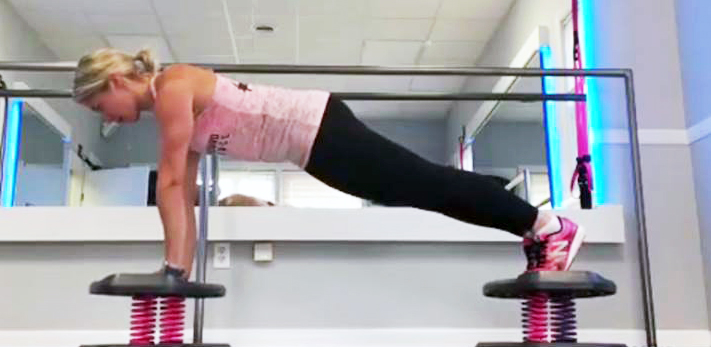
Today we are sharing a guest post from Danvers mom of three, Missy Sullivan. Missy is a lifelong fitness enthusiast who had an eye-opening experience after the birth of her third child, struggling with Diastasis Recti. She now knows how crucial it is to have the corrective training before, during and after pregnancy, which motivated her to pursue helping others exercise correctly, launching Core Redefined in 2018.
If you’re a new mom reading this, who is feeling bad about her body or anxious about getting back into a fitness routine, please stop and remember this: You created life! Just give yourself a moment to embrace that fact!
The excitement of carrying your baby and getting ready for their arrival, may have put your self-care on the back burner. Take a moment to assess. How do you feel now? How does your body and mind feel? Pregnancy can take a toll on the body due to growth and hormonal shifts which can develop into pregnancy ailments such as, abdominal separation (Diastasis Recti), core weakness, weight gain or retention, aches and pains, incontinence, etc. If you are experiencing any of these ailments, they need your attention!

Diastasis Recti is commonly defined as ab separation and happens when the core’s inner unit is not transferring forces effectively when regulating intra-abdominal pressures. If you are experiencing poor posture, pelvic floor weakness or incontinence, distended or protruding abdomen months or years after delivery (“mummy tummy”), or bulging/doming along the midline while performing exercises you may want to get assessed or self test yourself for Diastasis Recti.
It’s important to know that you can’t expect yourself to jump back into things postpartum–you need healing time. Yes, your body is fully capable of regaining its strength and function, but dedicating time to rehab and reconnect to your body is highly recommended. That way these pregnancy related issues don’t continue to result in body imbalances/misalignments, injuries, prolapse, or hernias.
Unfortunately, our healthcare system hasn’t caught up to the needs for postpartum women, so many of us don’t get the education and care needed to recover after pregnancy or the marathon that is labor and delivery. A rehab program should focus more attention on returning to optimally functioning bodies verse weight loss, as well as learning how to heal and strengthen from the inside out. This way you can go back to things you love, like a strength training program, bootcamp classes, running, or just enjoying an active, pain-free lifestyle.
The drive to “bounce back,”or “lose the baby weight,” after pregnancy can be very hard to resist, especially when you receive the clearance to workout. We all get the 6 week (or 8 week) clearance, but what does that mean? Can you go back to what you were doing pre-pregnancy? Do you need modifications? Should you work through pain, coning or doming in the abdominal region, or leaking? Did you know you can do more harm than good if you are not connected to your recovering body? During pregnancy, ligaments have been stretched, core and pelvic floor are weakened, and it can be uncomfortable and unsafe to return immediately to high impact exercises, increasing your risk of injuries.

Seeking advice and guidance from a Postnatal Corrective Exercise Fitness Specialist and a Women’s Health Pelvic Floor Physical Therapist or Physiotherapist can help teach you how to rehab your body through building a strong foundation, as well as the ability to help heal, recover and restore body functions before going back to demanding activities or fitness routines. This is the missing piece in postpartum fitness!
Here’s how each of the specialists work on helping you recover after birth:
- A Women’s Health Pelvic Floor Physical Therapist or Physiotherapist will check your pelvic floor muscles at a medical level, determining strength, release and coordination.
- A Pre/Postnatal Corrective Exercise Specialist & Core/Diastasis Recti Consultant will educate you and help you manage intra-abdominal pressures during movements and exercises. They will teach you corrective exercise techniques and strategies for breathing, proper alignment, connections through the inner core unit, as well as guidance on movements. This will help you rehab before returning to exercise and activities without experiencing leaking or other postpartum ailments. The initial steps are to re-establish the connections in your deep core and pelvic floor muscles to create the foundation your body needs now and into the future.This starts with:
- Diaphragmatic breathing (DPH)- the most vital component to a training program
- Reconnection to your pelvic floor – whether you are under or over active, experiencing pain, pressure or discomfort, knowing how to relax and strengthen will help you create balance and support
- Core Belly Breathing Pumping – which starts with strengthening your transverse abdominal muscle, the deepest layer of abdominal muscles. Learn more about this technique on Missy’s YouTube Channel.
You deserve a well-functioning, supported body and that starts with a supported pelvic floor and core. Things don’t just “get better with time.” You shouldn’t have to accept “well you just had a baby,” or “I pee myself all the time…that’s just what happens when you’re a mom.”

All women deserve more guidance and support in postpartum, so trust in rehab strategies and education. It will take time and patience to recover and gain strength and control. If you’re interested in learning more about how Missy and Core Redefined, LLC. help educate and rehab pregnant and postpartum moms visit www.coreredefined.com or follow Missy at @fit_fierce_missy on Instagram or @coreredefined on Facebook.
